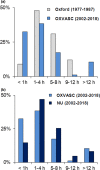Time trends, frequency, characteristics and prognosis of short-duration transient global amnesia
- PMID: 32012408
- PMCID: PMC7115816
- DOI: 10.1111/ene.14163
Time trends, frequency, characteristics and prognosis of short-duration transient global amnesia
Abstract
Background and purpose: Transient global amnesia (TGA) is characterized by a sudden onset of anterograde amnesia lasting up to 24 h. One major differential for TGA is transient epileptic amnesia, which typically lasts < 1 h. However, TGA can also be short in duration and little is known about the time trends, characteristics and prognosis of TGA cases lasting < 1 h.
Methods: We compared the clinical features of TGA ascertained in two independent cohort studies in Oxfordshire, UK [Oxford cohort 1977-1987 versus Oxford Vascular Study (OXVASC) 2002-2018] to determine the time trends of clinical features of TGA. Results were validated in another independent contemporary TGA cohort in Italy [Northern Umbria TGA registry (NU) 2002-2018]. We compared the risk factors, clinical features and long-term prognosis (major cardiovascular events, recurrent TGA and seizure/epilepsy) of patients presenting with episodes lasting < 1 h versus those lasting ≥ 1 h.
Results: Overall, 639 patients with TGA were included (114 Oxford cohort, 100 OXVASC, 425 NU). Compared with the original Oxford cohort, there were more cases with TGA lasting < 1 h in OXVASC [32 (32.0%) vs. 9 (8.8%)] and NU (11.8% vs. 8.8% in Oxford cohort). In both OXVASC and NU, patient age, vascular risk factors and clinical features were largely similar between those with TGA lasting < 1 h versus those lasting ≥ 1 h. Moreover, there was no difference in the long-term risk of seizure/epilepsy or major cardiovascular events between TGA lasting < 1 h versus TGA lasting ≥ 1 h.
Conclusions: Short-duration TGA episodes (<1 h) were not uncommon and were more frequent than in earlier studies. The clinical features and long-term prognosis of short-duration TGA did not differ from more typical episodes lasting ≥ 1 h.
Keywords: epilepsy; seizure; stroke; transient global amnesia.
© 2020 The Authors. European Journal of Neurology published by John Wiley & Sons Ltd on behalf of European Academy of Neurology.
Conflict of interest statement
The authors declare no financial or other conflicts of interest.
Figures
Comment in
-
For how long is memory lost in transient global amnesia?Eur J Neurol. 2020 May;27(5):737-738. doi: 10.1111/ene.14187. Epub 2020 Mar 16. Eur J Neurol. 2020. PMID: 32096297 No abstract available.
References
Publication types
MeSH terms
Grants and funding
LinkOut - more resources
Full Text Sources
Research Materials


